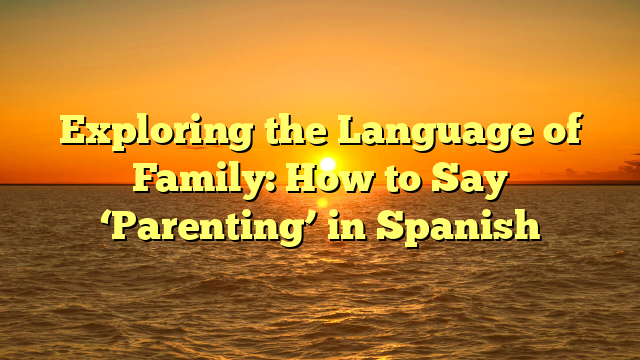Exploring the Language of Family: How to Say ‘Parenting’ in Spanish
Introduction
Language is a powerful tool that allows us to communicate and connect with others. It not only helps us express our thoughts and emotions but also shapes our understanding of the world around us. When it comes to family, language plays a crucial role in defining relationships and roles. In this article, we will explore the language of family and specifically focus on how to say ‘parenting’ in Spanish.
The Importance of Language in Family
Language is not just a means of communication; it also reflects cultural values and societal norms. The words we use to describe family relationships and roles can vary greatly across different languages. Understanding these linguistic nuances can provide us with a deeper insight into different cultures and their perspectives on family.
Defining ‘Parenting’
Before we delve into the Spanish translation of ‘parenting,’ let’s first understand what this term encompasses. Parenting refers to the process of raising and nurturing a child, including providing emotional support, guidance, and meeting their physical and psychological needs. It involves the responsibilities and actions taken by individuals who have a parental role in a child’s life.
How to Say ‘Parenting’ in Spanish
In Spanish, the word for ‘parenting’ is ‘crianza.’ This term encompasses the concept of raising and caring for a child, similar to the English term. However, it is important to note that language is not always a direct translation, and cultural nuances can influence the meaning and usage of words.
Other Related Terms
When discussing parenting in Spanish, it is helpful to be familiar with related terms that further describe different aspects of the parenting process. Here are a few examples:
- ‘Padres’ – This term translates to ‘parents’ in English and refers to both the mother and father.
- ‘Madre’ – This word means ‘mother’ in Spanish.
- ‘Padre’ – Similarly, ‘padre’ translates to ‘father’ in English.
- ‘Hijos’ – This term refers to ‘children’ in Spanish.
- ‘Educación’ – The Spanish word for ‘education,’ which is an integral part of parenting.
Comparing Parenting Practices
While the concept of parenting may be universal, the practices and approaches can vary across cultures. Let’s take a closer look at how parenting practices differ between Spanish-speaking countries and English-speaking countries.
Collectivism vs. Individualism
Spanish-speaking cultures often emphasize collectivism, where the needs of the family and community take precedence over individual desires. This can influence parenting styles, with an emphasis on interdependence and cooperation. In contrast, English-speaking cultures tend to prioritize individualism, encouraging independence and self-reliance in children.
Discipline and Authority
Parenting practices also differ when it comes to discipline and authority. Spanish-speaking cultures may place a greater emphasis on respect for authority figures, such as parents and elders. Discipline is often seen as a means of teaching and guiding children, rather than punishment. In English-speaking cultures, discipline may be more focused on individual rights and personal autonomy.
Parenting Resources in Spanish
For Spanish-speaking parents or those interested in learning more about parenting in a Spanish-speaking context, there are several resources available. These resources can provide valuable insights, tips, and support for navigating the challenges and joys of parenting.
Books
There are numerous books available in Spanish that cover various aspects of parenting. Some popular titles include:
| Title | Author |
|---|---|
| ‘Criando a tus hijos con amor’ | Ross Campbell |
| ‘Educar sin gritar’ | Guillermo Ballenato |
| ‘Disciplina sin lágrimas’ | Daniel J. Siegel and Tina Payne Bryson |
Online Communities
Online communities and forums can be a great source of support and advice for parents. There are several Spanish-language parenting communities where parents can connect, share experiences, and seek guidance. Some popular online communities include:
- ‘Padres en la Red’
- ‘Bebés y más’
- ‘Ser Padres’
Conclusion
Language is a powerful tool that shapes our understanding of family and parenting. Exploring the language of family in different cultures allows us to gain a deeper appreciation for the diversity of parenting practices and perspectives. In Spanish, ‘crianza’ is the word used to describe parenting, encompassing the responsibilities and actions taken by individuals who have a parental role in a child’s life. By understanding the language of family, we can foster greater cultural understanding and empathy.

